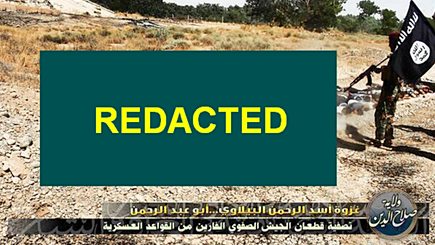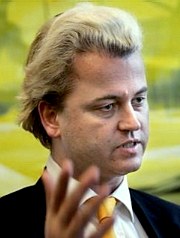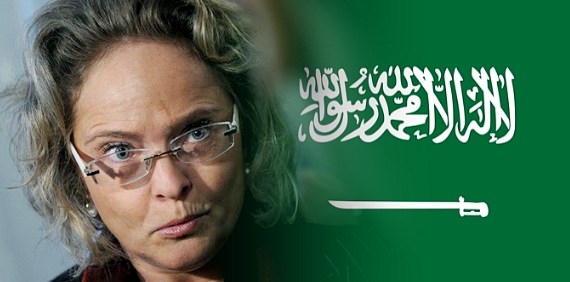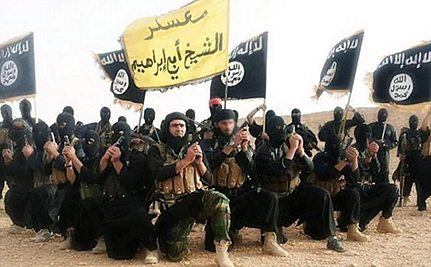Claudia Bandion-Ortner is a prominent Austrian politician and judicial official who also happens to be the Deputy Secretary General of the King Abdullah Bin Abdulaziz International Center for Interreligious and Intercultural Dialogue, a Vienna think tank funded in large part by the Kingdom of Saudi Arabia.
Thanks to the recent rise of the Islamic State, Austrians, like most Westerners, have become more aware of the “fundamentalist” brand of Islam as practiced by the mujahideen of ISIS. The more astute members of the Austrian public have noticed the essential similarity between the doctrines, habits, and customs of Saudi Arabia and those of the Islamic State.
Judge Bandion-Ortner’s role has come under public scrutiny as a result of this heightened awareness. She got herself into a bit of trouble last week after giving an interview to a major news outlet. Public outrage was aroused by her ill-considered remarks about public beheadings in Saudi Arabia, but that’s not really the most appalling thing about this interview; it’s simply the most sensational. Her more humdrum responses are even worse: they reveal someone who has moved far beyond the status of “useful idiot” and become an active collaborator with Islam.
Rembrandt Clancy deserves our deep gratitude for undertaking the major task of translating the interview and ancillary material about Claudia Bandion-Ortner.
Elisabeth Sabaditsch-Wolff sends this introduction to the scandal:
Claudia Bandion-Ortner is in trouble. What she said in the interview is not in line with the Austrian government’s position on human rights, and there have been attempts to have her removed from her current position at the Center.
In addition, the two governing parties — ÖVP and SPÖ — are playing ping pong about whose fault the Center is: originally, it was former foreign minister Michael Spindelegger who had pushed for its establishment, eyeing more Saudi investment in Austria as a result. However, SPÖ chancellor Werner Faymann gave his OK as well, and cannot escape responsibility. Both parties are currently “looking into” the contracts — due for renewal, if only the contract for the building — in order to perhaps cancel the Center here in Vienna.
The media are upset about the privileges garnered by the Center’s employees: they enjoy the same status as UN employees, that is: they pay no income taxes, among many other privileges.
What also irks the Austrian government is the fact that so far nothing has resulted from the Center’s activities. This does not come as a surprise: “interfaith and intercultural” dialogue has been around for a while now, and has not yielded any tangible results anywhere.
Could it be that we should be grateful to Mrs. Bandion-Ortner for her “stupid” remarks?
One thing is for certain: public perception has changed dramatically since her interview. Coupled with the Islamic State and ever more Austrian IS fighters making their way to Jihad, this could turn out to be the long-awaited wake-up call for those with their sleepyheads perpetually stuck in the sand. To mix metaphors, it’s high time to face the music. Or, better, reality. It will bite us if we don’t watch out.
Interview with Claudia Bandion-Ortner on everyday life in Saudi Arabia: “Beheadings don’t happen every Friday”
An Interview with former Minister of Justice Claudia Bandion-Ortner on her work as Secretary-General of the controversial “King Abdullah Dialogue Centre” in Vienna and her entirely positive impressions of Saudi Arabia. Plus: Excerpts from the conversation taken from Audio Files.
Interviewer: Christa Zöchling
Source: profilonline
October 21 2014
Translator: Rembrandt Clancy
Profil online’s Preamble
[Translator’s note: The original profil online source prefaces the interview by embedding three brief German-language audio files, each under separate headings, all three corresponding to controversial statements made by Claudia Bandion-Ortner. These three audio recordings are translated below. Because the “King Abdullah Dialogue Centre” challenged the “correctness” of the interview, profil’s intent in revealing the audio recordings, was to verify that Claudia Bandion-Ortner made the statements the magazine publisher claims she made.]
Translation of the Three Recorded Audio Excerpts from profil’s Interview
Bandion-Ortner on executions and the death penalty
Profil: “… and every Friday afternoon after Friday prayers public executions occur…”
Bandion-Ortner: “That does not happen every Friday; that is nonsense, it is nonsense. I am against it… Of course I am against any death penalty….”
Bandion-Ortner on the Black Abaya [garment that hangs from the neck to the feet]
“I did not have to wear any head covering. But the abaya is mandatory. You have to already have it on in the plane… it is practical. It is a comfortable garment. It reminded me a little of the judge’s robe; I am certainly accustomed to that.”
Bandion-Ortner on a Ladies’ Night
“One evening was a so-called Ladies’ Night; which is to say, I met only women. And I was surprised how cultivated and highly intelligent the women there were; managers and university professors. And it seemed to me like a ladies’ circle in Austria. There was really no difference.”
[Translator’s note: At first glance it may escape the reader that the otherwise insignificant “Ladies’ Night” in Saudi Arabia was an expression of gender apartheid. Hence criticism has arisen to the effect that the “emancipated” Claudia Bandion-Ortner implicitly endorses this policy by her presence at the event itself and by her subsequent statement in the interview. Humanistische Pressedienst (hpd) makes the point that she trivialises gender apartheid by comparing two situations which lack equivalence, since a “ladies’ circle” in Austria represents freedom of association. The hpd asks rhetorically if Bandion-Ortner is talking in this manner because she is “full of anxiety concerning the loss of her post” at the King Abdullah Dialogue Centre, even though “she has several times been at pains to explain that Saudi Arabia has absolutely nothing at all to do with the Centre.]
The Interview
profil: The whole world is talking about the terrorism of the Islamist IS brigades. What does the Saudi-financed König-Abdullah Centre in Vienna make of it?
Continue reading →
 A man armed with an axe attacked a police car in Washington D.C., embedding his axe in the driver’s side window. The policeman inside was uninjured, and got out to chase and grapple with the assailant, who managed to escape. However, police and residents of the District of Columbia may rest assured that the incident had nothing to do with Islam.
A man armed with an axe attacked a police car in Washington D.C., embedding his axe in the driver’s side window. The policeman inside was uninjured, and got out to chase and grapple with the assailant, who managed to escape. However, police and residents of the District of Columbia may rest assured that the incident had nothing to do with Islam.



 I just took some shirts and we went away and I didn’t know where we went, where we would go. The police didn’t even know. We changed cars and we ended up in an army barrack. And since then, 10 years ago, I have not been home.
I just took some shirts and we went away and I didn’t know where we went, where we would go. The police didn’t even know. We changed cars and we ended up in an army barrack. And since then, 10 years ago, I have not been home.



